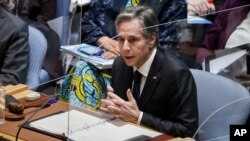“These are unprecedented times,” declared Secretary of State Antony Blinken at the United Nations International Migration Review Forum. There are some 95 million migrants on the move around the world today, more than at any time since World War II. “As people leave their homes in search of safety and opportunity, undertaking perilous journeys, it’s critical that countries and institutions work together to make migration safer and more orderly,” stressed Secretary Blinken.
Forging a common approach to managing migration and protecting vulnerable people is the intention of the Global Compact for Migration. The Compact is the first inter-governmentally negotiated agreement, under the auspices of the United Nations, covering all dimensions of international migration in a holistic and comprehensive manner. The United States seeks migration policies that are grounded in human rights, human dignity, transparency, and state sovereignty, said Secretary Blinken. “And we’re committed to partnering with civil society, with governments, the private sector, and international institutions like the United Nations, because this is a challenge that no one of us can solve alone.”
Several Global Compact countries in the Western Hemisphere have led the way by providing legal status and services to people fleeing repression and made education available to their children. International organizations and nongovernmental groups are providing support after climate-related disasters and training local officials in climate resilience and adaptation to help communities that are now threatened with being displaced because of the climate crisis.
The United States will work closely with its partners to build on the progress that’s being made. In June, at the Summit of the Americas, “we’ll continue developing a collaborative response to irregular migration throughout our hemisphere where the issue is particularly acute,” said Secretary Blinken. “Together, we’re working on the root causes of irregular migration, including a lack of economic opportunity, insecurity, corruption and repressive governance, climate-related emergencies, to address why people are leaving their homes in the first place.”
The U.S. is also working to expand legal pathways for migration, including allocating more than 50,000 additional temporary worker visas this year, expanding family reunification programs, and funding support for vulnerable migrants and refugees around the globe.
The United States will continue to work for safe, orderly, and humane migration around the world. As a nation built and enriched by immigrants, this issue is particularly close to our hearts.
Blinken At UN Migration Forum

The United States seeks migration policies that are grounded in human rights, human dignity, transparency, and state sovereignty.













